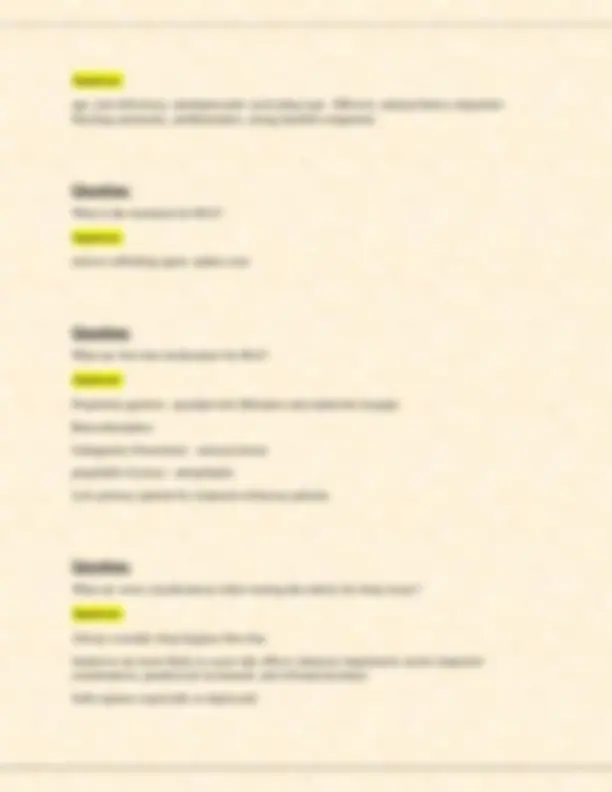











Study with the several resources on Docsity

Earn points by helping other students or get them with a premium plan


Prepare for your exams
Study with the several resources on Docsity

Earn points to download
Earn points by helping other students or get them with a premium plan
Community
Ask the community for help and clear up your study doubts
Discover the best universities in your country according to Docsity users
Free resources
Download our free guides on studying techniques, anxiety management strategies, and thesis advice from Docsity tutors
Exam 2: NSG552 / NSG 552 (Latest 2025 / 2026): Psychopharmacology | Grade A | Questions and Answers (Verified Elaborations) 100% Correct – Wilkes
Typology: Exams
1 / 16

This page cannot be seen from the preview
Don't miss anything!










What is agoraphobia and how can it be treated?
intense fear of being in public pleases where escape or obtaining help may be difficult Treat with CBT and SSRI
What treatment is used for generalized anxiety disorder
First line - SSRI Second line - Buspar (anxiolytic), SNRI Can consider short term course of benzos or augmentation with buspirone (Buspar) SSRI - escitalopram (Lexapro), paroxetine (Paxil), SNRI - duloxetine (Cymbalta), venlafaxine (Effexor)
What is used to treat panic attacks?
initially use benzos short term
What is used to treat panic disorder?
First line- SSRI, SRNA Second line- TCAs, though limited use Adjunct - benzo with caution, short-term until SSRIs reach therapeutic efficacy Alprazolam (Xanax) is FDA approved SSRI - Fluoxetine (Prozac), Paxil (paroxetine), Zoloft (sertraline), SNRI - Effexor (venlafaxine) TCA - clomipramine (Anafranil), imipramine (Tofranil)
What is social phobia and how is it treated?
fear of scrutiny by others or fear of acting in humiliating or embarrassing way CBT First line - SSRI or SNRI Benzos can be used as scheduled or PRN Beta blockers such as atenolol (50-100 mg) and propranolol (20-40 mg) 1 hour before performance or public speaking
What is used to great specific phobias?
CBT with exposure
What effects does GABA lead to?
Potentiate effects of GABA (GABA is inhibitory and lead to drowsiness, cognitive impairments, dampening of fear and anxiety, impaired balance, motor control, muscle tone, and coordination, and anterograde amnesia
Who is at greater risk of fall risk and hip fracture on benzodiazepines?
Elderly patients
What is the mechanism of action for benzodiazepines?
enhance activity of GABA at GABA-A receptors
Why are benzodiazepines not always the best choice of medicatioon
potential for abuse and addition may become physically dependent may build tolerance
What can be used to treat akathisia?
Benzodiazepines can be used to treat the uncontrollable urge to move and fidgeting movements
How is choice of BDZ decised?
time of onset, duration of action, and method of metabolism OTL = metabolized outside the liver (lorazepam, oxazepam, temazepam)
What are side effects of BDZ?
anticholinergic (dry mouth, constipation, urinary retention, blurred vision, increased HR), unusual behavior4s, hallucinations, daytime drowsiness, amnesia
What is a known limitation of benzo
Characteristics of Buspirone (Buspar)
slower onset of action than benzos (takes several weeks) Augmentation with other agents such as SSRI Low potential for abuse/addiction Dosed 2-3 times per day NO PRN
What endocrine medical conditions mimic or worsen anxiety
hyperthyroidism, hypothyroidism, Cushing's disease, Addison's disease, menopause pheochromocytoma
What cardiovascular medical conditions mimic or worsen anxiety
acute coronary syndrome, arrhythmia, CHF, Hypertension, hypotension, mitral valve prolapse
What neurological medical conditions mimic or worsen anxiety
epilepsy, cardiovascular disease, Meniere's disease, migraines, encephalitis, early dementia
What metabolic medical conditions mimic or worsen anxiety
porphyria, diabetes
What pulmonary medical conditions mimic or worsen anxiety
asthma, COPD, pulmonary embolism, pneumonia
What is PTSD
the development of multiple symptoms after exposure to one or more traumatic events
What is the hippocampus?
complex brain structure embedded deep in the temporal lobe that plays a major role in learning and memory
What are the symptoms of PTSD?
Multiple personality disorder in which more than one distinct personality state results from a fragmented sense of self
Who usually develops DID?
victims of significant and chronic childhood trauma
What do patients with DID often cope with?
What is the standard treatment for DID
Psychotherapy
What medication can be used for DID?
SSRIs - target comorbid depressive and PTSD symptoms Prazosin - nightmares
Naltrexone (Vivitrol) - opioid agonist used to reduce self-injurious behaviors
Can electroconvulsive therapy be used with DID?
ECT can be used in people with DID - they have depressive symptoms and ECT can be considered a viable option especially in combination with psychotherapy
What medications can be used for sleep onset?
Eszopiclone (Lunesta) - non-benzo hypnotic Zaleplon (Sonata) - non-benzo hypnotic zolpidem (Ambien) - non-benzo hypnotic Triazolam (Halcion) - benzodiazepine and controlled substance Temazepam (Restoril) - benzodiazepine Ramelteon (Rozerem) - melatonin receptor agonist
What medications are used for sleep maintenance?
Suvorexant (Belsomra) - Dual orexin receptor antagonist (DORA) Eszopiclone (Lunesta) - non-benzo hypnotic Zolpidem (Ambien) - non-benzo hypnotic Temazepam (Restoril) - benzodiazepine
Modafinil (Provigil)- first line pharmacologic treatment - CNS stimulant which promotes wakefullness
What is the drug of choice for cataplexy?
Sodium oxalate - avoid use with alcohol or other CNS depressants TCA - imipramine (Tofranil), desipramine (Norpramin), clomipramine (Anafranil)
What are REM suppression drugs?
SSNI - fluoxetine (Prozac), SNRI - duloxetine (Cymbalta), atomoxetine (Strattara), venlafaxine (Effexor)
Do non-benzo hypnotics affect REM sleep
Non-benzo hypnotics DO NOT affect REM sleep
What is a problem found with OTC sedative/hypnotics?
tolerance to sedating effects can develop rapidly
Describe Ramelteon (Rozerem)
Selective melatonin (MT1 and MT2) agonist that is effective and safe sleep aid due to no tolerance or dependance It DOES NOT act on benzo receptors
What are non-pharmacological interventions for sleep apnea
weight loss, avoidance of alcohol, CPAP, uvulopalatopharyngoplasty
What are the characteristics of restless leg syndrome (RLS)?
urge to move legs accompanied by unpleasant sensations in the legs relief with movement, aggravation with inactivity worse in the evening 1.5-2 times more likely in males
What are the risk factors for RLS?
Trazadone - serotonin receptor antagonist and reuptake inhibitor Remeron (mirtazapine) - TCA